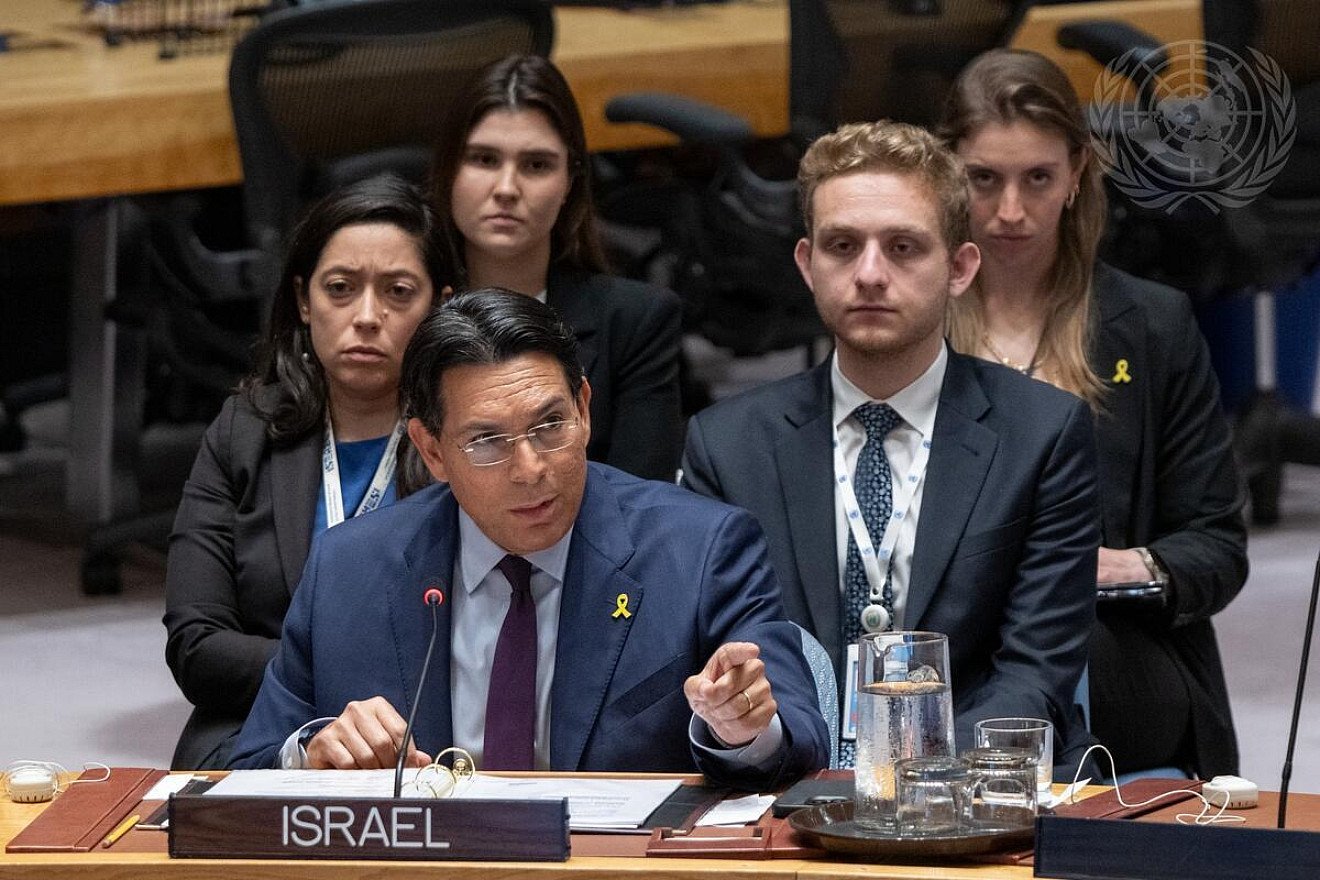 ‘While you continue talking, we will continue with actions,’ Danon tells UN Security Council
‘While you continue talking, we will continue with actions,’ Danon tells UN Security Council
Mike Wagenheim
The Israeli envoy told the Security Council that the Jewish state attacked the Iranian regime alone, “not because we wanted to but because we were left no other option.”
 Danny Danon, the Israeli ambassador to the United Nations, speaks at a U.N. Security Council meeting, June 13, 2025. Credit: Eskinder Debebe/U.N. Photo.
Danny Danon, the Israeli ambassador to the United Nations, speaks at a U.N. Security Council meeting, June 13, 2025. Credit: Eskinder Debebe/U.N. Photo.
Danny Danon, the Israeli ambassador to the United Nations, posed a question to the U.N. Security Council, during an emergency session on Friday. “How long did the world expect us to wait?” the Israeli envoy asked.
The session was called in response to multiple Israeli strikes on nuclear and military sites in Tehran, including on the Natanz nuclear facility on Friday morning.
“While you continue talking, we will continue with actions,” Danon told the body.
The Security Council is charged with global safety, but Israel has long accused the body of failing to hold the Iranian regime accountable for its violations of nuclear guidelines and for funding and training terror proxies throughout the region.
The head of the International Atomic Energy Agency, whose recent report on Iran’s persistent violations of IAEA regulations led to Tehran’s censure by the watchdog’s board of governors, told the council remotely that nuclear sites should be off limits.
“Such attacks have serious implications for nuclear security, nuclear safety and safeguards, as well as regional and international peace and security,” said Rafael Grossi, the agency’s director-general.
“It is clear that the only sustainable path forward for Iran, for Israel, the entire region and the international community is one grounded in dialogue and diplomacy to ensure peace, stability and cooperation,” he said.
The Jewish state received no criticism from the United States, with Washington’s envoy telling the council it backs Jerusalem’s actions.
“Israel advised us this action was necessary for its self-defense,” said McCoy Pitt, senior bureau official of the State Department’s Bureau of International Organization Affairs. “Every sovereign nation has the right to defend itself and Israel is no exception.”
Pitt said that the United States was informed ahead of Israel’s strikes but was not involved in them—a caveat that the White House and U.S. State Department have reiterated. Pitt also echoed warnings that U.S. President Donald Trump and other officials have issued against Iran attacking U.S. troops.
“Let me be crystal clear. No government, proxy or independent actor should target American citizens, American bases or other American infrastructure in the region,” Pitt said. “The consequences for Iran would be dire.”
The window for negotiating a revived nuclear pact with Iran remain open, Pitt said, adding that “Iran’s leadership would be wise to negotiate at this time.”
Iran’s envoy called Israel’s operation a “barbaric and criminal attack,” specifically the targeted assassinations of senior military officials, nuclear scientists and innocent civilians.
Amir Saeid Iravani, the Iranian ambassador, told the council that Israeli attacks on nuclear facilities, including additional ones on Friday, defied “common conscience” and warned of the potential of the release of radiological material.
“Those who support this regime, with the United States at the forefront, must understand that they are complicit,” he said. “By aiding and enabling these crimes, they share full responsibility for the consequences.”
“Israel did not act recklessly. We waited,” Danon said, calling the operation “an act of national preservation.”
“It was one we undertook alone, not because we wanted to but because we were left no other option,” he said.
The Saudi and French foreign ministries, which were set to co-host a high-level international conference on an Israeli-Palestinian two-state solution at the United Nations next week, postponed the event in light of Israel’s operation and what is likely to be several days or more of military activity in the Middle East.
Zawartość publikowanych artykułów i materiałów nie reprezentuje poglądów ani opinii Reunion’68,
ani też webmastera Blogu Reunion’68, chyba ze jest to wyraźnie zaznaczone.
Twoje uwagi, linki, własne artykuły lub wiadomości prześlij na adres:
webmaster@reunion68.com
